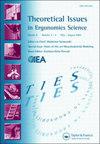“Is something amiss?” Investigating individuals’ competence in estimating swarm degradation
IF 1.4
Q4 ERGONOMICS
引用次数: 2
Abstract
Abstract Robotic swarms comprise component assets operating via local control algorithms which emulate natural swarming behaviors. Scientists are beginning to focus on the human-centered topic of human-swarm interaction. In a novel within-subjects design, we followed this comparatively nascent focus and investigated whether people can detect swarm degradations in assets flocking via consensus, their accuracy in estimating those degradations, and their confidence in those estimates. We also assessed open-ended responses to shed light on the strategies people may use to detect swarm degradations. Participants were recruited online and viewed 21 randomized simulations, each 30 seconds in duration with varying proportions of asset degradation. Results showed that the proportion of asset degradation did have an effect on the aforementioned criteria. Qualitative themes showed preliminary evidence that participants used common strategies to detect the time and degree of swarm degradation. However, we did not find evidence of a linear effect of the degradation manipulation on criteria of interest, which did not support our expectations. We discuss limitations and future research perspectives in detail, which we believe provide fodder for future work to investigate human-swarm interaction at a more granular level.“出什么事了吗?”研究个体估计群体退化的能力
摘要机器人集群包括通过模拟自然集群行为的局部控制算法操作的组件资产。科学家们开始关注以人为中心的人类群体相互作用的话题。在一项新颖的受试者内部设计中,我们遵循了这一相对新生的焦点,并调查了人们是否能够通过共识检测到资产集群中的集群退化,他们估计这些退化的准确性,以及他们对这些估计的信心。我们还评估了开放式反应,以阐明人们可能用来检测群体退化的策略。参与者在网上被招募,并观看了21个随机模拟,每个30个 持续时间为秒,资产退化的比例各不相同。结果表明,资产退化的比例确实对上述标准产生了影响。定性主题显示了初步证据,表明参与者使用了共同的策略来检测群体退化的时间和程度。然而,我们并没有发现降解操作对感兴趣的标准产生线性影响的证据,这并不支持我们的预期。我们详细讨论了局限性和未来的研究前景,我们认为这为未来在更精细的层面上研究人类群体相互作用提供了素材。
本文章由计算机程序翻译,如有差异,请以英文原文为准。
求助全文
约1分钟内获得全文
求助全文

 求助内容:
求助内容: 应助结果提醒方式:
应助结果提醒方式:


